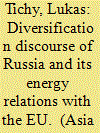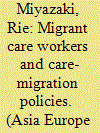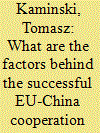|
|
|
Sort Order |
|
|
|
Items / Page
|
|
|
|
|
|
|
| Srl | Item |
| 1 |
ID:
167128


|
|
|
|
|
| Summary/Abstract |
The article explores the energy security relations between the Russian Federation and the European Union. The focus, however, is not on the technical and institutional aspects of the relationship, but rather on the discursive approach that determines the prevailing interpretations of the relationship by the two parties. The aim of this article is to analyze the content and basic themes of the Russian diversification discourse on energy relations with the European Union in 2004–2018. At the theoretical level, the article is based on critical constructivism, which, in relation to the discourse, and security as the main concepts, reflects a number of pieces of fundamental knowledge. At the methodological level, the article is based on thematic analysis. In the article, it is the main method of data analysis through which we examine the content of the Russian diversification discourse on the energy relations.
|
|
|
|
|
|
|
|
|
|
|
|
|
|
|
|
| 2 |
ID:
167124


|
|
|
|
|
| Summary/Abstract |
In today’s world, globalization and internationalization of education necessitate new initiatives to catch the new era. Turkey, as a country in between the east and the west, attempts to do so through its recent exchange program in higher education. Interestingly, Turkey’s Mevlana exchange program as an ambitious project in higher education denotes an instance of policy transfer: taking the EU model (i.e., Erasmus) and slightly adjusting it to the national circumstances. This article unpacks Turkey’s Mevlana program to demonstrate the process of policy transfer by focusing on different questions posed within the policy transfer literature. It argues that Mevlana is drawn from Erasmus, and it is created as a tool of soft power that is increasingly exercised by Turkey due to its changing focus within the Turkish foreign policy of 2000s.
|
|
|
|
|
|
|
|
|
|
|
|
|
|
|
|
| 3 |
ID:
167136


|
|
|
|
|
| Summary/Abstract |
Global climate governance still faces serious challenges despite the epochal Paris Agreement of 2015. Whether and how the world will reach the targeted 1.5-degree limit remains difficult to foresee, although undoubtedly one of the necessary conditions is greater cooperation among the major greenhouse gas (GHG) emitting nations. In this light, the decision by the USA, the second largest GHG emitter in the world, to withdraw from the Paris Agreement has significant global ramifications. Another source of uncertainty is the European Union’s climate policy, which has long been a role model for the world; it will likely have to undergo major changes as a result of the UK’s exit from the EU, which is projected to take place in 2019. Against this backdrop of profound geopolitical changes, this article argues that strengthened cooperation between the EU and China—the world’s largest GHG emitter, but also its largest investor in renewable energy and an increasingly vocal voice for climate action—is indispensable for meaningful climate change mitigation and adaptation in the decades ahead, even if the end results still fall short of the ambitions outlined in the Paris Agreement. Diverging economic and political interests still exist, but there is also much common interest and ample room for collaboration. We review the progress and challenges in EU-China cooperation on climate change and put forward practical suggestions for plausible future directions.
|
|
|
|
|
|
|
|
|
|
|
|
|
|
|
|
| 4 |
ID:
167127


|
|
|
|
|
| Summary/Abstract |
Japan and Italy are the most aging societies in the developed countries and they both face the rapid increase of the social cost and the demand in manpower for long-term care. Both countries have the common welfare state trajectories and characteristics. In contrast, both the care and migration policies and the role of migrant care workers between Italy and Japan are consistently different. The paper compares the welfare state characteristics, care configurations, and the care-migration policies in 2000s, and reveals how the role of migrant care workers in Italy and Japan would be influenced by the migrant and care policies reciprocally. The paper concludes that the combination of the restricted migrant policies for unskilled migrant care workers and the in-kind-based national care policies is significant in efforts to maintain a qualified and regulated care work. Conversely, it verifies that the in-cash-based national care policy with the weak migration control for unskilled migrant workers brings the spread of marketized care with weak control and low professional skills, mostly in the gray market.
|
|
|
|
|
|
|
|
|
|
|
|
|
|
|
|
| 5 |
ID:
167133


|
|
|
|
|
| Summary/Abstract |
This article explores the UK’s foreign policy “pivot” to Asia, a decade after its tentative beginnings. This pivot is understood to be Britain’s planned redirection of attention and resources to Asia which emerged gradually from around 2007/2008, before intensifying from 2010. It is argued that the pivot has been evident across distinctive phases and political, economic and security dimensions, while lacking organisation, clarity and purpose, leaving it partial and incomplete. Examined are the motivations for the pivot and the forms it has taken, its accomplishments and ultimately what the pivot reveals about the role and influence the UK claims in Asia today. It is shown that in its key trade and investment aims, the pivot has achieved mixed results, doing little to enhance the UK’s position as a tertiary-level partner of Asia. However, Britain’s agency and importance is best explained not by its quantities, but its qualities, of power, occupying the regional roles of “subcontractor” and “facilitator”. Finally, the article looks to Britain’s future in Asia. Exiting the EU would likely see the UK retain its status of subcontractor, while its ability to act as facilitator would almost certainly diminish. The article concludes by arguing that, despite the rhetoric of the pivot, Britain’s presence in Asia will never be defined by its quantities of material power, and that it should work to sustain the qualities of power on which its regional presence is built.
|
|
|
|
|
|
|
|
|
|
|
|
|
|
|
|
| 6 |
ID:
167132


|
|
|
|
|
| Summary/Abstract |
Against the background of ever stronger linkages between the EU and China as well as their emphatically voiced objective to jointly shape the increasingly multi-polar world, the article at hand endeavors to address the question how a liberally informed EU and a politically distinctly illiberal China may actually come to cooperate, that is, “work together for a common purpose”. To this end, this analysis reviews the past decade of EU-China normatively divergent, and even competitive encounters in Central Asia’s security realm and, on this basis, delineates a possible future mode of EU-China interaction in and beyond Central Asia, illustrating what cooperation between normatively divergent powers could look like in a multi-polar age.
|
|
|
|
|
|
|
|
|
|
|
|
|
|
|
|
| 7 |
ID:
167134


|
|
|
|
|
| Summary/Abstract |
Analysing the relations between the EU and China one can notice a growing network of links on all levels, including subnational. Within the framework of the One Belt One Road (OBOR) Initiative Chinese regions are eager to develop contacts with European counterparts. The case of the Lodzkie region’s (Poland) cooperation with Sichuan Province is often presented in media as a flagship example of taking the advantage of the possibilities posed by the OBOR. The direct cargo train connection with China has been accompanied by close political relations on the regional level as well as academic cooperation. Neither distance nor great asymmetries between the partners impede smooth collaboration in the Lodzkie case. The main aim of this paper is to answer the question what are the factors behind the success of the Lodzkie region in order to recognise the conditions that may play an important role in the process of building strong bilateral links between European and Chinese subnational units. The Lodzkie case clearly shows the key role of the personal factor. Politicians and officials have identified a great potential in a small-scale business initiative and have helped it to enhance in cooperation with local stakeholders (the city authorities, academia, local companies). Moreover, they have been able to create an attractive story which appeals to international media and attracts business.
|
|
|
|
|
|
|
|
|
|
|
|
|
|
|
|
|
|
|
|
|